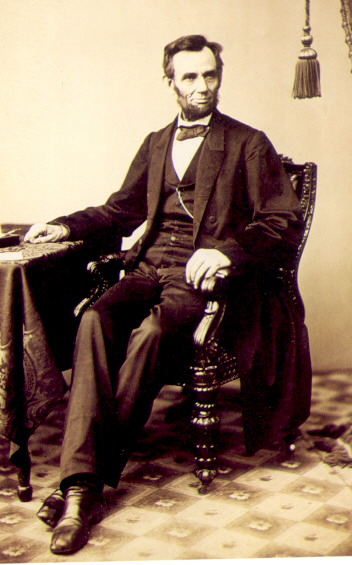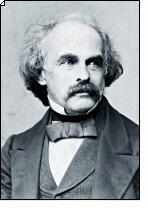|
|
Online Texts for Craig White's Literature Courses
|
|
|
Nathaniel Hawthorne description of Abraham Lincoln from Chiefly of War-Matters (1862) |
Hawthorne, 1804-64 |
[1] . . . Of course, there was one other personage, in the class of statesmen, whom I should have been truly mortified to leave Washington without seeing; since (temporarily, at least, and by force of circumstances) he was the man of men. But a private grief [the Lincolns' son Willie, b. 1850, died of fever in 1862] had built up a barrier about him, impeding the customary free intercourse of Americans with their chief magistrate; so that I might have come away without a glimpse of his very remarkable physiognomy [appearance], save for a semi-official opportunity of which I was glad to take advantage. The fact is, we were invited to annex ourselves, as supernumeraries [extras], to a deputation [group] that was about to wait upon [meet with] the President, from a Massachusetts whip-factory, with a present of a splendid whip.
[2] Our immediate party consisted only of four or five (including Major Ben Perley Poore [1820-87, leading journalist], with his note-book and pencil), but we were joined by several other persons, who seemed to have been lounging about the precincts of the White House, under the spacious porch, or within the hall, and who swarmed in with us to take the chances of a presentation. [<Note the lax security prior to Lincoln's assassination] Nine o’clock had been appointed as the time for receiving the deputation, and we were punctual to the moment; but not so the President, who sent us word that he was eating his breakfast, and would come as soon as he could. His appetite, we were glad to think, must have been a pretty fair one; for we waited about half an hour in one of the antechambers [entry-rooms], and then were ushered into a reception-room, in one corner of which sat the Secretaries of War and of the Treasury, expecting, like ourselves, the termination of the Presidential breakfast. During this interval there were several new additions to our group, one or two of whom were in a working-garb, so that we formed a very miscellaneous collection of people, mostly unknown to each other, and without any common sponsor, but all with an equal right to look our head-servant in the face.
[3] By and by there was a little stir on the staircase and in the passage-way, and in lounged a tall, loose-jointed figure, of an exaggerated Yankee* port and demeanor, whom (as being about the homeliest man I ever saw, yet by no means repulsive or disagreeable) it was impossible not to recognize as Uncle Abe. [*"Yankee" traditionally means New Englander, which Hawthorne was and Lincoln was not; implication of common stock yet leading qualities of American type]
[4] Unquestionably, Western man though he be, and Kentuckian by birth, President Lincoln is the essential representative of all Yankees, and the veritable specimen, physically, of what the world seems determined to regard as our characteristic qualities. It is the strangest and yet the fittest thing in the jumble of human vicissitudes, that he, out of so many millions, unlooked for, unselected by any intelligible process that could be based upon his genuine qualities, unknown to those who chose him, and unsuspected of what endowments may adapt him for his tremendous responsibility, should have found the way open for him to fling his lank personality into the chair of state,— where, I presume, it was his first impulse to throw his legs on the council-table, and tell the Cabinet Ministers a story.
[5] There is no describing his lengthy awkwardness, nor the uncouthness [primitive or wild quality] of his movement; and yet it seemed as if I had been in the habit of seeing him daily, and had shaken hands with him a thousand times in some village street; so true was he to the aspect of the pattern American, though with a certain extravagance which, possibly, I exaggerated still further by the delighted eagerness with which I took it in. If put to guess his calling and livelihood, I should have taken him for a country schoolmaster as soon as anything else. He was dressed in a rusty black frock-coat and pantaloons, unbrushed, and worn so faithfully that the suit had adapted itself to the curves and angularities of his figure, and had grown to be an outer skin of the man. He had shabby slippers on his feet. His hair was black, still unmixed with gray, stiff, somewhat bushy, and had apparently been acquainted with neither brush nor comb that morning, after the disarrangement of the pillow; and as to a night-cap, Uncle Abe probably knows nothing of such effeminacies. His complexion is dark and sallow [yellow-brown], betokening, I fear, an insalubrious atmosphere around the White House [DC built on swampland]; he has thick black eyebrows and an impending brow; his nose is large, and the lines about his mouth are very strongly defined.
[6] The whole physiognomy [facial constitution] is as coarse a one as you would meet anywhere in the length and breadth of the States; but, withal, it is redeemed, illuminated, softened, and brightened by a kindly though serious look out of his eyes, and an expression of homely sagacity [down-to-earth wisdom], that seems weighted with rich results of village experience. A great deal of native sense; no bookish cultivation, no refinement; honest at heart, and thoroughly so, and yet, in some sort, sly,—at least, endowed with a sort of tact and wisdom that are akin to craft, and would impel him, I think, to take an antagonist in flank, rather than to make a bull-run at him right in front. But, on the whole, I like this sallow [brownish-yellow], queer, sagacious visage [face], with the homely human sympathies that warmed it; and, for my small share in the matter, would as lief [been inclined to] have Uncle Abe for a ruler as any man whom it would have been practicable to put in his place.
[7] Immediately on his entrance the President accosted our member of Congress, who had us in charge, and, with a comical twist of his face, made some jocular remark about the length of his breakfast. He then greeted us all round, not waiting for an introduction, but shaking and squeezing everybody’s hand with the utmost cordiality, whether the individual’s name was announced to him or not. His manner towards us was wholly without pretence, but yet had a kind of natural dignity, quite sufficient to keep the forwardest of us from clapping him on the shoulder and asking him for a story.
[8] A mutual acquaintance being established, our leader took the whip out of its case, and began to read the address of presentation. The whip was an exceedingly long one, its handle wrought in ivory (by some artist in the Massachusetts State Prison, I believe), and ornamented with a medallion of the President, and other equally beautiful devices [ornamentations]; and along its whole length there was a succession of golden bands and ferrules [metal rings]. The address [speech of presentation] was shorter than the whip, but equally well made, consisting chiefly of an explanatory description of these artistic designs, and closing with a hint that the gift was a suggestive and emblematic one, and that the President would recognize the [metaphorical] use to which such an instrument [the whip] should be put.
[9] This suggestion gave Uncle Abe rather a delicate task in his reply, because, slight as the matter seemed, it apparently called for some declaration, or intimation, or faint foreshadowing of policy in reference to the conduct of the war, and the final treatment of the Rebels [the Confederacy, the Union's opposition in U.S. Civil War, 1861-65]. But the President’s Yankee aptness and not-to-be-caughtness stood him in good stead, and he jerked or wiggled himself out of the dilemma with an uncouth dexterity [rough handiness] that was entirely in character; although, without his gesticulation of eye and month,— and especially the flourish of the whip, with which he imagined himself touching up a pair of fat horses,— I doubt whether his words would be worth recording, even if I could remember them. The gist of the reply was, that he accepted the whip as an emblem of peace; not punishment; and, this great affair over, we retired out of the presence in high good-humor, only regretting that we could not have seen the President sit down and fold up his legs (which is said to be a most extraordinary spectacle), or have heard him tell one of those delectable stories for which he is so celebrated. A good many of them are afloat upon the common talk of Washington, and are certainly the aptest, pithiest, and funniest little things imaginable; though, to be sure, they smack of the frontier freedom, and would not always bear repetition in a drawing-room, or on the immaculate page of the Atlantic. . . .
[10] Good Heavens! what liberties have I been taking with one of the potentates of the earth, and the man on whose conduct more important consequences depend than on that of any other historical personage of the century! But with whom is an American citizen entitled to take a liberty, if not with his own chief magistrate? However, lest the above allusions to President Lincoln’s little peculiarities (already well known to the country and to the world) should be misinterpreted, I deem it proper to say a word or two in regard to him, of unfeigned respect and measurable confidence. He is evidently a man of keen faculties, and, what is still more to the purpose, of powerful character. As to his integrity, the people have that intuition of it which is never deceived. Before he actually entered upon his great office, and for a considerable time afterwards, there is no reason to suppose that he adequately estimated the gigantic task about to be imposed on him, or, at least, had any distinct idea how it was to be managed; and I presume there may have been more than one veteran politician who proposed to himself to take the power out of President Lincoln’s hands into his own, leaving our honest friend only the public responsibility for the good or ill success of the career. The extremely imperfect development of his statesmanly qualities, at that period, may have justified such designs. But the President is teachable by events, and has now spent a year in a very arduous course of education; he has a flexible mind, capable of much expansion, and convertible towards far loftier studies and activities than those of his early life; and if he came to Washington a backwoods humorist, he has already transformed himself into as good a statesman (to speak moderately) as his prime-minister.



